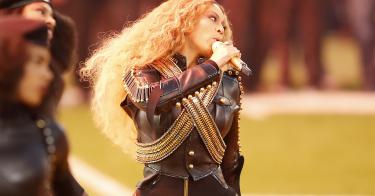By now, Beyoncé’s Super Bowl halftime ode to the Black Panthers has entered the national consciousness. We all know what she was driving at. She was channeling the meme of the “black lives matter” movement. But why use the symbolism of the Black Panthers? After all, the group has long and sordid history of violence.
Why raise such a divisive symbol of racial militancy and separatism to the pinnacle of a Super Bowl halftime show? The answer is quite simple: because it shocks—or at least it’s intended to shock.
Taking a movement that once was known to have shootouts with the police, and even occasionally torture and murder snitches in its ranks, and then to make that movement a symbolic carrier of the “black lives matter” movement, was meant to convey a very simple message. It is now “cool” to embrace violence, mayhem, and frankly even racial separatism in the cause of civil rights.
In my new book, “The Closing of the Liberal Mind: How Groupthink and Intolerance Define the Left,” I call this cultural phenomenon “authoritarian cool.” It’s the use of entertainment to convey the message that not only is it okay to demonize and oppress your cultural enemies, sometimes even with violence, but it is absolutely necessary to do so. As I explain:
When actor Sean Penn told CNN’s Piers Morgan in 2013 that Tea Party favorite Ted Cruz, a Republican senator from Texas, should be hospitalized in a mental institution, even the famously liberal Morgan was shocked. “Actually have him committed?” he asked. Penn seemed nonplussed and simply said, “I think it’s a good idea.” When Susan Sarandon and one of the actors of “Real Housewives of New Jersey” found out that a teacher at a Catholic school posted a critical remark of sexual liberationist Dan Savage on her private Facebook page, they tried to have her fired. In a 2015 Playboy Magazine article, rapper Azealia Banks said she hated “fat white Americans” and “these racist conservative white people who live on farms.”
You get the picture. Some of our most popular entertainers are not exactly constrained when it comes to expressing authoritarian values.
Entertainers are notoriously liberal. There’s nothing new about Carlos Santana sporting Che Guevera t-shirts or Pete Seeger spouting communist propaganda. But what is new is the degree to which today’s most popular entertainers are willing to indulge in fantasies of violence and mayhem. Some sound like bloody totalitarians.
This is particularly worrisome for a culture such as ours. It is increasingly focused on and defined by popular entertainment. The lines between entertainment and politics are now completely blurred. Social media is only adding fuel to the fire. There is a gleeful abandon on Twitter in making “epic takedowns” of opponents and driving their proverbial noses into the digital dust. And our movies and TV shows glorify revenge and narcissism to the point where they are not merely acknowledged as social realities, but actually accepted as positive expressions of the human condition.
Here’s the danger. Former Hubert Humphrey speechwriter John P. Roche once told National Review columnist John Fund that “[i]f authoritarianism of the right or left ever comes to America, it will come surrounded by patriotism and show business.”
So true. The Super Bowl’s opening act of Lady Gaga belting out the Star Spangled Banner was followed by the halftime display of black revolutionary nationalism. The juxtaposition was not an accident. It was intended to show the latter is now acceptable by the former.
We had best be careful about the kind of entertainment we wish for. We may find ourselves someday on the wrong side of Penn’s wish to institutionalize people.
This piece originally appeared in The Daily Signal



